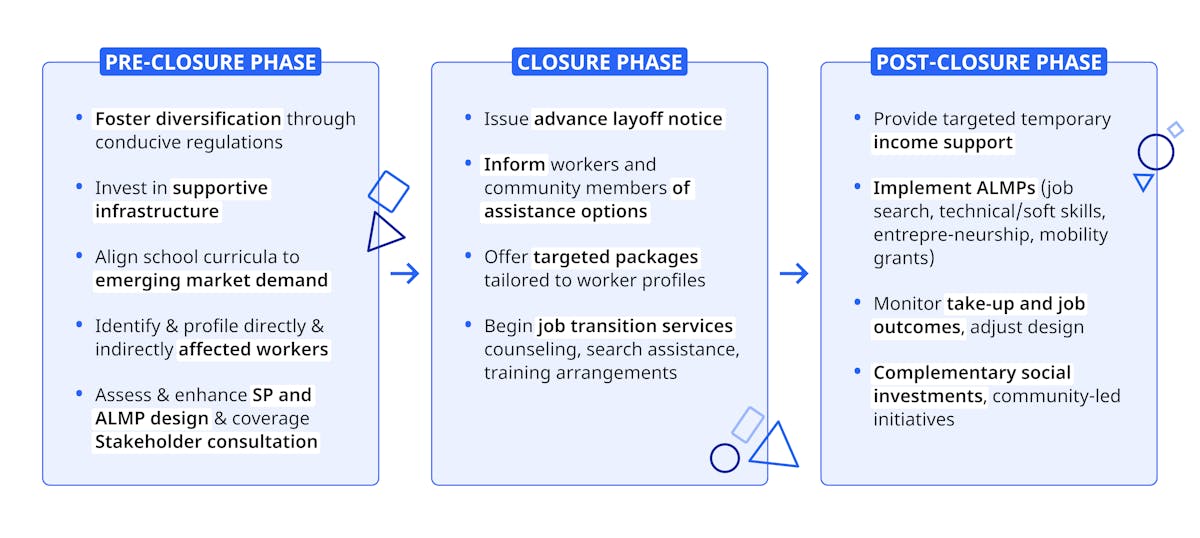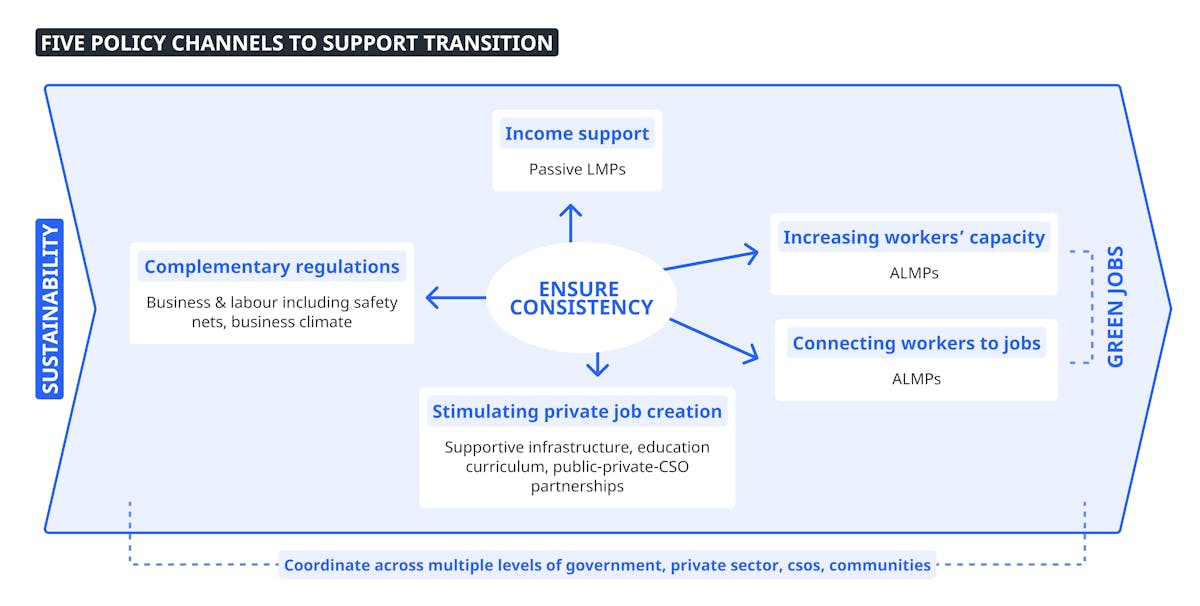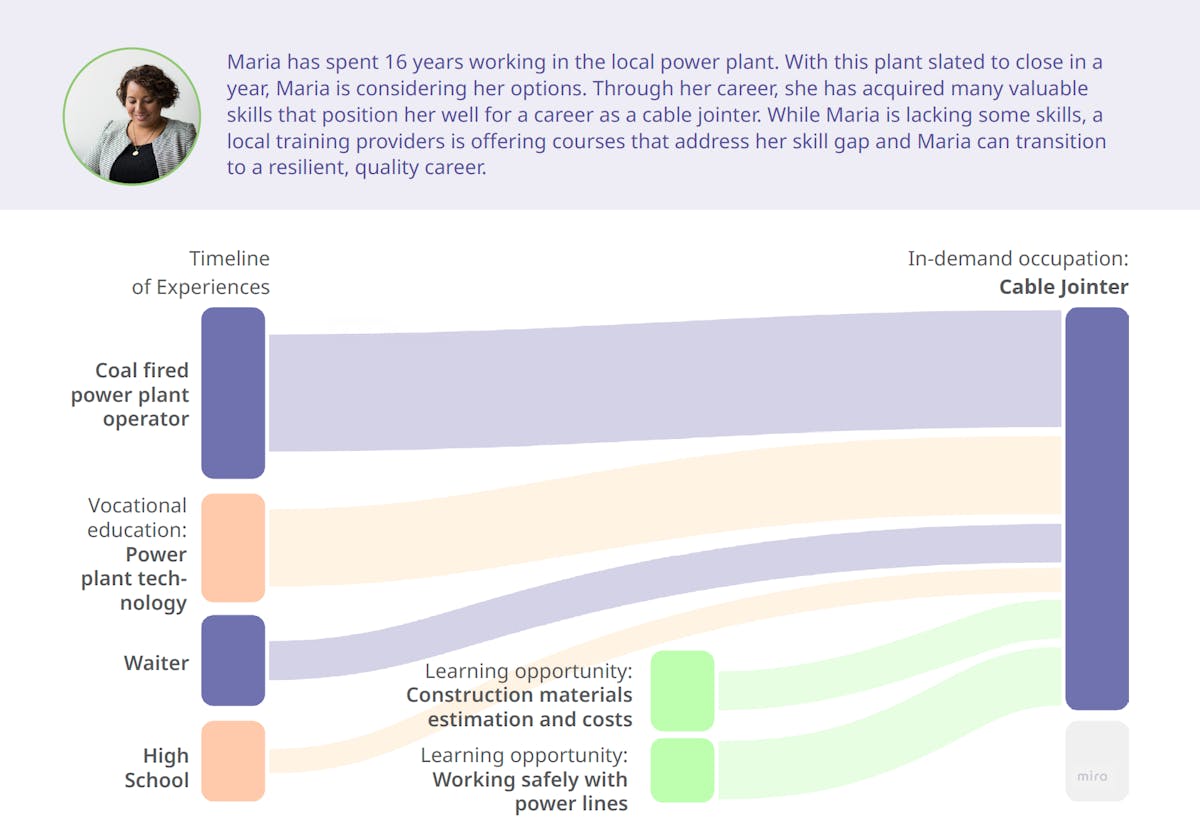Just Skills Hub: Enabling Just Transition for Fossil Fuel Workers
The transition to net-zero economy is reshaping the lives and livelihoods of countless individuals and communities. Carbon-intensive sectors face the most profound challenges, with jobs intricately tied to the carbon-intense resources. The Just Skills Hub has developed a toolkit that helps to ensure that transitions are just and the weight and burden on the most affected regions is minimized. We believe that our focus on skills, education and employment is vital in achieving a just transition, prioritizing people and communities.
The transition to a net-zero economy will transform the lives and work of many people and communities. The direction and extent will vary depending on their job and industry. With the impact of the transition not homogenous, certain industries and regions will be affected more deeply than others. Workers in carbon-intensive industries that can be replaced will likely face the harshest consequences of the transition. In many cases, carbon-intensive jobs are heavily concentrated around the natural resource that is being exploited. In the case of coal, almost all employment in industries relying on said coal is located in and around the mining areas, the same is true for oil and gas, whether on- or offshore. In shifting our mode of energy production from carbon-intensive to carbon-neutral, the weight of the transition should not be placed on workers and communities in carbon-intensive industries alone. If going green is a net positive, we have to find a way to minimize the burden on workers and communities in the most affected regions.
The complexities of the green transition and extent of challenges are the reason why we lead the Just Skills Hub, convened by the UN High Level Champions for Global Climate Action at COP26. A focus on skills, workforces and employment is essential to ensure that transitions are just. Below, we explore how our approach at the Just Skills Hub aligns with best practices and principles to support regionally specific, place-based transformation processes, while putting people and communities first.
Clear pathways for skills and technology allow us to accelerate the race to zero emissions in energy and industry. The Just Skills Hub and its partners can leverage data tools to create these pathways and inform better policy and business planning, today.
A Global, Local Transition Challenge
International organizations, including the World Bank, European Union, the OECD, IMF and others have realized the risk that this poses. Especially considering that many of the most affected regions are already structurally weak, as former centers of manufacturing and industrial activity that have been in decline. We have reviewed the suggested approaches and best practices identified and aligned our approach. Broadly speaking, methodologies have emphasized intervening as early as possible and using a multidisciplinary approach that goes beyond the old model of outplacement, typically associated with mass layoff scenarios. The World Bank has summarized intervention in Global Perspective on Coal Jobs and Managing Labor Transition out of Coal: Key Issues and Policy Responses in three phases:

A new, comprehensive approach
Using the World Bank report as an example, the report outlines five policy channels that can enable regions and communities to work toward a truly just transition:

The Just Skills Hub approach and toolkit is closely aligned with these channels. Our approach is focused on identifying the skills of affected workers to increase capacity and skills of workers in a targeted manner that recognizes workers’ existing skill sets. This allows us to prepare and connect workers directly with good, resilient jobs. At the same time, we create the skill data needed for private job creation, curriculum design and targeted industrial policy. Our toolkit for actionable steps to foster just transitions include:
- Identify affected workers:
The Just Skills Hub works with employers, trade unions, governments and other stakeholders to identify affected workers, focusing on workers most at-risk - Conduct A Skills Audit:
The Hub relies on SkillLab technology to conduct a granular skills audit, relying on widely adopted public skill and occupation taxonomies. Understanding and recognizing the skills of the affected workers is crucial in ensuring a people-centered transition. - Build Partnerships to Manage Transitions and Include Social Partnerships:
The Just Skills Hub serves as a co-creation and collaboration platform for the various stakeholders of the transition. The Hub engages trade unions, employer organizations, community organizations and governments to build durable and effective partnerships. - Identify Resilient and Adjacent Occupations:
In order to ensure that workers can transition, the Hub, together with labor market information providers and experts, identifies resilient occupations that suit the identified skills of the affected workers. Resilient and adjacent occupations have positive employment outlooks, are locally available, and require skill sets that are complementary to the skills of affected workers. - Identify Pathways:
Building on the skills of affected workers and resilient and adjacent occupations, pathways to these careers are identified. This entails identifying the necessary education and training workers would need to transition into adjacent and resilient occupations. - Design curricula and skilling pathways to ensure workers can transition:
Based on the collected data, governments, employers and education providers can design education or training programs which will offer the necessary skills needed for successful transitions. - Inform Industrial Policy and Job Creation Efforts:
Governments and policy makers can learn from the data garnered by the Just Skills Hub and use it to inform labour market and industrial policy, attracting industries that require skills that are complementary to the skills of affected workers. - Begin Provision of Early Job Search and Career Guidance Assistance:
The Just Skills Hub makes use of the core SkillLab mobile application in this stage to offer on-going career guidance to affected workers and communities. - Provide Ongoing Active Labour Market Policy Support and Guidance:
A sustainable and resilient workforce requires continuous guidance and reflection. The Hub believes that ongoing support to monitor the progress of the implementation of policies and adapt to changing labor markets.

Going green is a catalyst for innovation, new opportunities and job creation. But, reducing carbon emissions and phasing out carbon intensive energy sources can have significant regional downsides. There are nuances to the transition to a net-zero economy. Large-scale layoffs, inadequate investments, and flawed policy designs can carry high fiscal and economic costs, affecting workers, businesses, and communities alike. In previous transitions - the industrial revolution, automation and globalization, workers and communities were too often left behind. It is incumbent on us to ensure that this transition will be different, especially because the green transition is largely perceived as being politically driven. The backlash, if we fail to ensure a just transition, could be significant.